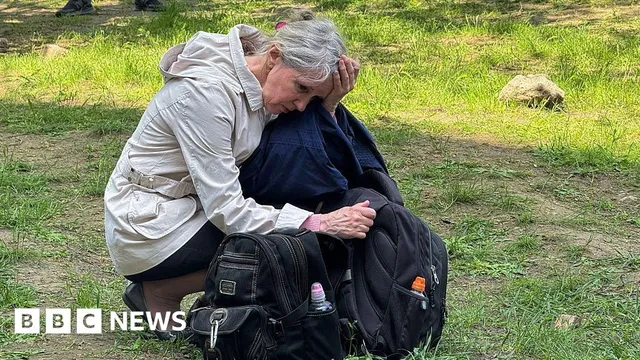
Zelensky rejects Russia's demand for Crimea recognition amid talks
2025-04-25 05:14- Diplomats from multiple countries are pushing for a ceasefire in ongoing conflict.
- Russia may be willing to halt its invasion if Ukraine recognizes Russian claims to Crimea.
- Ukrainian President Zelensky's refusal to recognize Crimea complicates peace talks.
Express your sentiment!
Insights
Ukraine has been embroiled in a war with Russia since February 2022, following Russia's annexation of Crimea in 2014. Recently, UK, US, France, and Germany diplomats convened in London to seek a ceasefire in the drawn-out conflict, which marks a critical diplomatic moment. Speculation arose that Russia might be willing to halt its military advances in return for concessions. However, Ukrainian President Volodymyr Zelensky firmly rejected any proposals that would involve recognizing Crimea as part of Russia, indicating ongoing tensions despite negotiations. Sergey Lavrov, the Russian Foreign Minister, stated that negotiations are moving positively, emphasizing Russia's readiness to finalize a deal. However, the complexities surrounding territorial claims, specifically Crimea, remain contentious points. Lavrov criticized Zelensky, claiming the Ukrainian leader has hindered negotiations by not considering a formal acknowledgment of territorial realities. Simultaneously, Moscow seeks essential security guarantees, such as Ukraine's neutrality and a prohibition on NATO installations in Ukraine. The backdrop of these developments includes ongoing military activity in Ukraine, where recent reports indicate that despite Russia's unilateral call for a temporary ceasefire over Easter, attacks have not ceased. UK Defense Secretary John Healey confirmed that Russian military efforts were continuing, contradicting any claims of peace. Both sides have faced heavy casualties in this conflict, which has lasted over three years and triggered a significant refugee crisis. While hopes for a meaningful resolution are rising, the pathway remains fraught with challenges, especially in light of past failures to achieve a lasting peace. The diplomatic efforts aim to strike a balance between de-escalating violence and addressing the underlying issues that fueled the conflict. However, the diverging positions on Crimea signify deep-rooted disagreements that may complicate future negotiations.
Contexts
The ongoing conflict in Ukraine has prompted significant international responses since its onset in 2014, particularly following the full-scale invasion by Russia in February 2022. The global reaction has been characterized by strong condemnation of Russia's actions, resulting in a series of coordinated sanctions targeting key sectors of the Russian economy, including energy, finance, and technology. These sanctions aim to weaken Russia's military capabilities and compel a withdrawal from Ukrainian territory. The response has been led predominantly by Western nations, notably members of the European Union and NATO, who have collaborated on imposing these measures while also providing substantial political and financial support to Ukraine. Military assistance to Ukraine has escalated dramatically since the invasion, with various countries pledging arms, ammunition, and other military resources. This support has included advanced weaponry such as anti-tank missiles, air defense systems, and artillery equipment, enabling Ukrainian forces to mount a more effective defense against Russian advances. Notably, the United States has emerged as a key ally, committing billions of dollars in military aid and fostering partnerships with other nations to enhance Ukraine’s defense capabilities. NATO, amidst its commitment to collective defense, has reaffirmed its solidarity with Ukraine, although it has stopped short of direct military intervention to avoid escalating the conflict into a wider war. Humanitarian aid has also been a critical component of the international response, with many countries and organizations stepping up to provide support to millions of displaced individuals and those affected by the conflict. Efforts have focused on delivering food, medical supplies, and shelter to those in need, both in Ukraine and among refugees in neighboring countries. International organizations such as the United Nations have played a vital role in coordinating these humanitarian efforts, highlighting the urgent need for sustained assistance as the conflict prolongs. The response underscores a significant global solidarity with Ukraine, marked by various humanitarian initiatives and fundraising efforts to alleviate the suffering caused by the war. At a diplomatic level, the international community has convened numerous summits and discussions aimed at finding a resolution to the conflict. While various peace negotiations have taken place, they have so far yielded limited success, with disagreements over territorial integrity and security guarantees remaining central obstacles. Additionally, the war has sparked broader discussions about security and geopolitical stability in Europe, leading nations to re-evaluate their defense policies and strategies. The ramifications of the Ukraine war will undoubtedly shape international relations for years to come, reinforcing the need for cohesive action against aggression and a reaffirmation of collective security in the face of emerging threats.